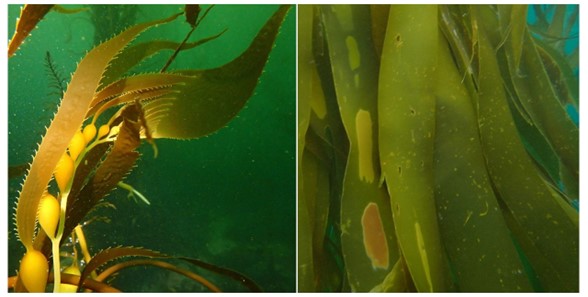Overview
 Left: Juvenile giant kelp (Macrocystis pyrifera). Right: Reproductive portions of bull kelp blades (Nereocystis luetkeana). CDFW photos by K. Elsmore
Left: Juvenile giant kelp (Macrocystis pyrifera). Right: Reproductive portions of bull kelp blades (Nereocystis luetkeana). CDFW photos by K. Elsmore
The California Department of Fish and Wildlife, in partnership with the California Ocean Protection Council, is developing a statewide, ecosystem-based, adaptive Kelp Restoration and Management Plan (KRMP) for giant kelp, Macrocystis pyrifera, and bull kelp, Nereocystis luetkeana. The KRMP will include a cohesive kelp management strategy (PDF)(opens in new tab) which consists of three core components:
- An innovative framework for ecosystem-based management of kelp forests
- A harvest management framework and other Fishery Management Plan elements required by the Marine Life Management Act
- A Restoration Toolkit
The integration of ecosystem-based management approaches and a Restoration Toolkit into the traditional Fishery Management Plan framework will facilitate a robust, adaptive, climate-ready approach to managing the State's kelp forest ecosystems in the face of changing ocean conditions.
KRMP Development Process
A multi-pronged approach (PDF)(opens in new tab), consisting of a Community Working Group, Science Advisory Committee, and Tribal Engagement, has been implemented to ensure the development of the KRMP is informed by the best available science and community perspectives across the State.
The Community Working Group (CWG) is an informal advisory body composed of California Native American tribes, stakeholders, and interested members of the public established to help inform the design and development of the KRMP. The goals of the Community Working Group are to advise on and inform the development of the core components of the KRMP. CWG members are tasked with sharing information about the KRMP development with their broader community networks, as well as tasked with gathering and sharing their communities’ perspectives, interests, and feedback. The list of CWG members can be found in the KRMP CWG Charter (PDF). If you would like to talk with one or more CWG members, please reach out to our kelp staff (contact information below).
The Science Advisory Committee (SAC) is an independent body tasked with providing scientific expertise on all aspects of the KRMP to ensure the best available and most current science is directly integrated into the KRMP. The SAC is composed of experts (PDF) in natural and social sciences, economics, and local and traditional knowledge, spanning a broad scope of disciplines and geographic areas.
Pathways for Tribal Engagement throughout the development of the KRMP include Tribal Roundtable Listening Sessions, government-to-government consultation, representation on the Community Working Group, and representation on the Science Advisory Committee. Additional pathways for engagement may be identified as the KRMP development process unfolds. A top priority for the State is to provide California Native American tribes the opportunity to inform the design and development of the KRMP’s process and outcomes, including exploration of co-management pathways, if this is identified as a priority by California Native American tribes.
KRMP Timeline
The KRMP development process is anticipated to occur over the course of three to five years. More details and information will be made available on this website and on the California Fish and Game Commission's website.
2022
2023
2024
- Community Working Group meeting; agenda (PDF), meeting summary (PDF), and slides (PDF) (March)
- Science Advisory Committee meeting, agenda (PDF) (April)
- Tribal Community Virtual Forum (July)
- Community Working Group meeting; agenda (PDF), meeting summary (PDF), and slides (PDF) (August)
- Science Advisory Committee meeting; agenda (PDF), and meeting summary (PDF) (August)
- Science Advisory Committee meeting; agenda (PDF), and meeting summary (PDF) (October)
- Community Working Group meeting; agenda (PDF), meeting summary (PDF), and slides (PDF) (December)
- Science Advisory Committee meeting; agenda (PDF), meeting summary (PDF) (December)
2025